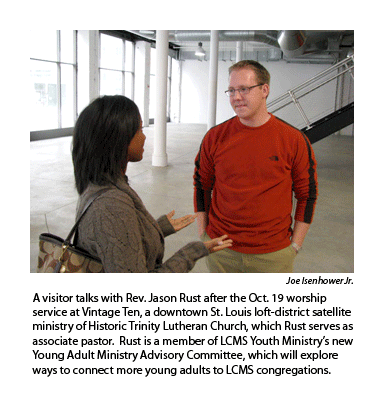By Joe Isenhower Jr.
A newly formed advisory committee of young adults wants to help Synod congregations reclaim what has been called “a missing generation” among church rolls nationwide and in the Missouri Synod — young adults in their 20s and 30s.
LCMS Youth Ministry formed the Young Adult Ministry Advisory Committee of seven members – all within that age category — to “grapple with why young adults aren’t involved in the church, and share findings and observations with the church as we explore what can be done to get them connected to a congregation,” s aid Jessica Bordeleau, coordinator of Lutheran Youth Fellowship and Young Adult Ministry with the youth-ministry office, and the committee’s convener.
aid Jessica Bordeleau, coordinator of Lutheran Youth Fellowship and Young Adult Ministry with the youth-ministry office, and the committee’s convener.
All based in the St. Louis area, committee members are Anne Meyer, director of Youth and Young Adults Ministry at Chapel of the Cross — Lutheran; Rev. Ryan Peterson, associate pastor, St. John Lutheran Church, Ellisville, Mo.; Faith Spellbring, ambassador manager for Lutheran Hour Ministries; Rev. Jeff Cloeter, assistant pastor at Christ Memorial Lutheran Church; Rev. Jason Rust, associate pastor at Historic Trinity Lutheran Church; Josh Brown, a Concordia Seminary student whose field-work assignment is with Christ in the City Lutheran Church; and Bordeleau.
Their first meeting was in mid-September.
The decision to involve only St. Louis-based members is due in part to the fact that the committee has no travel budget, according to Bordeleau. And although this also means that meetings are within short driving distances, their locations are intentionally relevant. For instance, in keeping with the culture of the age group that the committee will work to attract, its second meeting was set for early November in a suburban coffee shop.
Bordeleau also pointed out that each committee member works in a congregation or other ministry setting aimed at strengthening outreach to unchurched young adults or enhancing young-adult members’ engagement in congregational ministry.
She told Reporter that committee members “have so much passion and motivation to reach young adults for Christ. It is wonderfully exciting and encouraging to work together with them. When the group talks about ministry to young adults, we don’t see them as statistics and numbers. They are our peers, our friends. We want the church to join us in making a concerted, intentional effort to reach our generation with the love of Christ.”
Ministry among young adults is “sorely needed” in all Christian churches, including the LCMS, according to Dr. Terry Dittmer, director of LCMS Youth Ministry, who recalled that the Pew Forum on Religion and Public Life reported earlier this year that its survey on religious affiliation found that “among Americans ages 18 to 29, one in four say they are not currently affiliated with any particular religion.
“The fact of the matter is, we Lutherans do a pretty good job keeping most of our youth connected to God and church through their high-school years,” Dittmer said.
He added that fact is supported by the 1995 National Study of Youth and Religion listing the LCMS “in a group of ‘conservative churches’ that retains 86 percent of their teens through 12th grade.”
But he continued that the 1995 study also found that “at the end of high school, when their relational networks change and young adults go to college, into the military, or to work, they drop out of church at alarming rates. And the church,
historically, has let that happen,” he said.
Bordeleau related that “in the past, many of those young adults eventually returned to the church once they married and had kids.
“But this model just isn’t happening anymore,” she said.
“Young adults are marrying later and having kids later. By this time, their lifestyle is already established, and church just isn’t a part of it. Outreach strategies that were successful in the past are not reaching this population.”
“There hasn’t been a focused synodical or district effort at addressing the need,” Dittmer said.
“Both the research I’ve read and my experiences have shown that this is indeed a missing generation in our churches,” Bordeleau said.
Bordeleau also is director of Christian education at Timothy Lutheran Church in St. Louis, which she describes as “a diverse urban congregation.”
In addition, she spent four years mentoring young adults at Camp Luther in Wisconsin, where she developed a mentorship program for them that included meeting regularly with older Christians to talk through goal setting, objective strategies, prayer, and Bible study.
“That experience really taught me a lot about the needs and culture of young adults,” she said. “I learned first-hand their intense need and desire for authentic community, meaningful service opportunities, and a way to make a difference in the world.”
She emphasized that it’s those needs and desires that the new committee hopes to help congregations “facilitate” for young-adult members and prospective members.
Bordeleau noted that while many young adults are unchurched, “at the same time, we shouldn’t ignore the faithful ones who are part of our church body, but are often under-represented and misunderstood.”
She said she’s noticed that young adults are not only “too often lumped together with high-school youth and overlooked for leadership opportunities” in congregations, but that many older members “may assume that young adults wouldn’t want to build relationships with them.
“Young adults desire friendships with older Christians – friendships that can be so valuable to those in both age groups,” she concluded.
The Young Adult Ministry Advisory Committee adopted two goals at its first meeting:
“We plan to pursue these goals,” Bordeleau said, “by providing resources to raise awareness of the needs of young adults, to advocate the contributions of young adults to the church, and to provide opportunities for service and leadership development for young adults.”
She said that the committee plans to launch a Web site as early as next year to provide listings of best practices in young-adult ministry, links to books, training events, and other helpful resources. She said the committee also is exploring ways to “promote service leadership opportunities for young adults.”
For instance, committee members laid the groun



